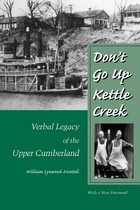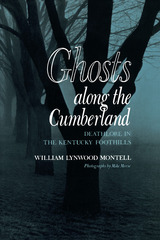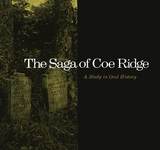3 books about Montell, William Lynwood

Don't Go Up Kettle Creek
Verbal Legacy Upper Cumberland
William Lynwood Montell
University of Tennessee Press, 2000
Don’t Go Up Kettle Creek is a historical portrayal of a river and the people who made their living along its banks and tributaries. Drawing upon the personal recollections and oral traditions of longtime residents, William Lynwood Montell describes a century and a half of life in the Upper Cumberland.
Montell organized his material according to the topics that dominated his tape-recorded conversations with residents of the area-farming, logging and rafting, steamboating, the Civil War-topics that the people themselves saw as important in their history. In reconstructing the past, the author also illuminates the relationship between geographic and economic factors in the region; the prolonged affects of a cataclysmic event, the Civil War, on the isolated area; and the impact of modernization, in the form of “hard” roads and cheap, TVA-supplied electricity, on the traditional ways of people.
First published in 1983, this book is now available in paperback for the first time. Included with this edition is a new foreword in which Montell and Mary Robbins, executive director of the Tennessee Upper Cumberland Tourism Association, describe changes in the area that have occured since the book’s initial appearance.
The Author: William Lynwood Montell, now retired, was coordinator of programs in folk and interculturual studies at Western Kentucky University. His numerous books include Ghosts along the Cumberland and The Saga of Coe Ridge.
Montell organized his material according to the topics that dominated his tape-recorded conversations with residents of the area-farming, logging and rafting, steamboating, the Civil War-topics that the people themselves saw as important in their history. In reconstructing the past, the author also illuminates the relationship between geographic and economic factors in the region; the prolonged affects of a cataclysmic event, the Civil War, on the isolated area; and the impact of modernization, in the form of “hard” roads and cheap, TVA-supplied electricity, on the traditional ways of people.
First published in 1983, this book is now available in paperback for the first time. Included with this edition is a new foreword in which Montell and Mary Robbins, executive director of the Tennessee Upper Cumberland Tourism Association, describe changes in the area that have occured since the book’s initial appearance.
The Author: William Lynwood Montell, now retired, was coordinator of programs in folk and interculturual studies at Western Kentucky University. His numerous books include Ghosts along the Cumberland and The Saga of Coe Ridge.
[more]

Ghosts Along Cumberland
Deathlore Kentucky Foothills
William Lynwood Montell
University of Tennessee Press, 1975
A fascinating collection of ghost stories, tales of the supernatural, death beliefs and death sayings that remain as a vestige of the part in south central Kentucky's "Pennyrile" region.
"This unique and extremely valuable book adds considerably to the area of folklore studies in the United States. The material which Montell obtained in his field work is superb."
--Don Yoder.
"This book is to be recommended to both folklorists and those non-folklorists who read folklore for enjoyment alone. It makes an important contribution to the study of deathlore and, it is to be hoped, will draw added attention to this multi-generic subject area."
--David J. Hufford, Tennessee Folklore Society Bulletin.
"Professor Montell's book can well be viewed as a standard of excellence: a direct, articulate and cataloged approach for future study and implementation in the fields of folklore and oral history."
--Joan Perkal, Oral History Association Newsletter.
"The book gives fascinating accounts of death beliefs, death omens, folk beliefs associated with the dead, and in the major section, ghosts narratives. A fine combination of scholarship and chilling narration to be relished by firelight in an old deserted house in the hills."
--Book Forum.
"Professor Montell has arranged beliefs and experiences about death of a particular group of people in such a way that a whole new aspect of the people's lives comes to focus."
--Loyal Jones, The Filson Club HIstory Quarterly.
[more]

Saga Coe Ridge
Study Oral History
William Lynwood Montell
University of Tennessee Press, 1970
Few black groups in the United States carry with them the romance, the gripping history, the pathos, the indestructible spirit of the Coe Ridge colony during the ninety years of its existence.
". . . a new and long needed departure in American historiography. . . . This is in every way an impressive book. It contains detailed accounts of the informants, tables of folklore motifs, genealogical charts, a prologue and epilogue explaining authoritatively the hypotheses of oral traditional history, and handsome photographs of the Coe Ridge area."
--Richard M. Dorson, Journal of American History.
"Lynwood Montell has written an invaluable book for all those interested in the use of oral tradition as a tool in the reconstruction of history. . . . This is a book worthy of being on any folklorist's shelf."
--Richaed A. Reuss, Journal of American Folklore.
". . . a new and long needed departure in American historiography. . . . This is in every way an impressive book. It contains detailed accounts of the informants, tables of folklore motifs, genealogical charts, a prologue and epilogue explaining authoritatively the hypotheses of oral traditional history, and handsome photographs of the Coe Ridge area."
--Richard M. Dorson, Journal of American History.
"Lynwood Montell has written an invaluable book for all those interested in the use of oral tradition as a tool in the reconstruction of history. . . . This is a book worthy of being on any folklorist's shelf."
--Richaed A. Reuss, Journal of American Folklore.
[more]
READERS
Browse our collection.
PUBLISHERS
See BiblioVault's publisher services.
STUDENT SERVICES
Files for college accessibility offices.
UChicago Accessibility Resources
home | accessibility | search | about | contact us
BiblioVault ® 2001 - 2024
The University of Chicago Press









